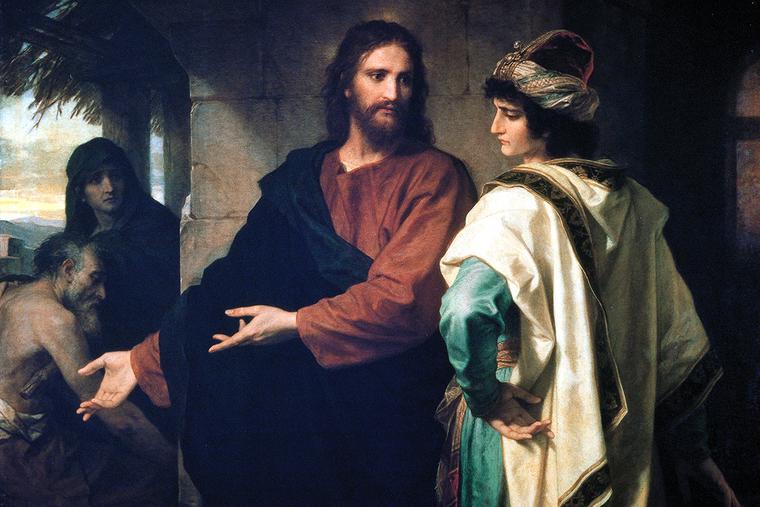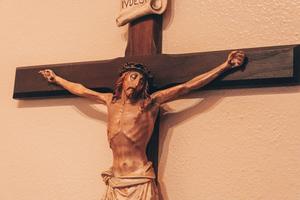This Sunday, We Consider Hell’s Bitter Motto: ‘It Might Have Been’
SCRIPTURES & ART: Today’s readings remind us that God sometimes gives us opportunities that knock only once.

We all wonder, when we are young, wonder what we should do with our lives. A not uncommon question to little children (and sometimes children with a college diploma in hand) is “what do you want to be when you grow up?” Youth is often a time of dreams and high hopes, as it should be.
In today’s Gospel, a young man asks Jesus a variation of that question. He’s clearly mature. He’s been thinking about how to live a good life and, as an observant Jew, he knows that a life lived wisely is a life lived according to God’s designs. It’s no accident today’s First Reading is from the Book of Wisdom.
He’s serious about the question. He just don’t collect wisdom from every passerby, like the spiritually aimless in search of a guru. He’s clearly heard and thought about Jesus, up to whom he runs. He calls him “Good.” And he asks for the secret to eternal life.
Jesus makes clear it’s no big secret. “You know the Commandments.” He even repeats five of the Ten.
The young man does indeed know them and has “observed them from [his] youth.” So … what else?
Jesus “looked at him with love” and offers him not just eternal life (hardly a “just”) but perfection: “One thing is wanting: go and sell what you have and give to the poor, then follow me.”
He didn’t. On either count.
Property is not bad: Catholic social doctrine even insists that private property is a human right, because people need a certain share of material goods in order to be secure in life. That’s why radical poverty is an evangelical counsel, not the eleventh commandment.
But behind evangelical poverty is an attitude that does bind every person: indifference towards created goods. They’re important. But they’re not God.
When St. Ignatius of Loyola spoke about “indifference,” he understood it differently from the radical poverty that characterized medieval mendicant orders like the Franciscans and Dominicans. For Ignatius, “indifference” was a recognition that while material goods were good, my relationship to them should be indifferent. If I can use them for the greater glory of God — ad majorem Dei gloriam — well and good. But if they are a stumbling block on the way to God, if they keep me from him, then attachment to God requires indifference to my attachments to goods.
In some respects, that is what the First Commandment is all about. There can be only one Supreme Good in my life. It can be the true God … or a false one. And those false ones come under many names including, today, “power,” “money,” “sex,” “security,” “autonomy,” etc.
To which one am I attached?
Jesus asked the young man where his attachments lay. He got his answer when the “young man went away sorrowful,” not for having lost Jesus but at the thought of losing his goods.
The painful truth is that we will all have to engage in that self-stripping of which Jesus asked the young man. “Naked I came from my mother’s womb, and naked I will depart,” observed Job (1:21). Tolstoy’s Pahom spends his life acquiring more and more land, until he drops dead demarcating the boundaries of his biggest acquisition. Tolstoy concluded that short story with this memorable line: “His servant picked up the spade and dug a grave long enough for Pahom to lie in, and buried him in it. Six feet from head to toe was all that he needed.”
In the George C. Scott version of A Christmas Carol, the Ghost of Christmas Past asks why Scrooge had let Belle, his fiancée, go. Scrooge answers he did not want to marry poor, opting to put things off until he made more money, “which I did.” The Ghost remarks, “You’ve told me what you gained. Now see what you lost,” revealing Belle’s life with another man.
Money or goods are not bad. They’re even good. But they have to be kept in perspective. We can do wrong not just by doing bad things, but by using good things badly. Indeed, because of our in-built orientation to the good, that is exactly what sin is: devaluing God by choosing idols.
That said, making the kind of choice Jesus asks of the young man is very risky. Most of us are risk-averse, and our society does not always prize risk-takers. But sometimes, that’s what you’ve got to do — especially starting out in life.
The Polish author Roman Brandstaetter wrote a poem about this young man. The narrator is the young man, many years later, now old. He looks back on his life. His wealth has doubled. He has a family and children. Any external observer would admit he’s done well. “People regard me as happy.”
But he remembers his question on that spring morning in his youth. “I chickened out. And went home.”
People think him happy. “But I feel a tangible void inside myself//a lack of fullness//a hopelessness//that I fear to reveal//even to those closest to me” — especially every time he remembers the question he put on that spring morning decades ago.
Heinrich Hoffman (1824-1911), a German painter of religious art, captured the moment in today’s Gospel in his 1889 work, “Christ and the Rich Young Ruler.”
Four figures populate the painting. The young man, arrayed in fine and luxurious clothing, a cap atop his head, stands in front of Jesus. Jesus gestures the way he should go, towards two poor people: an old man whose strength and vision is failing, supported by a young woman whose face (like Christ’s) looks into the face of the young man. The poor sustain each other with their arms, and Jesus’ arms point that way. The young man’s arms turn backwards, his face and body language indicating this was not the deal he was asking about. Two people’s faces avert: the poor sick man, who has no strength to look elsewhere, and the rich young man, who prefers not to see. Two people’s faces try to make a connection to his: the young woman’s, and Jesus’.
But, as Mark tells us, “he went away.”
The young man stands on a threshold. Jesus is the door and the Way.
But he chickened out. And went home.
The Gospels tell us nothing else of this young man. Perhaps he went away and continued to observe the Commandments. Perhaps, struck by his encounter with Jesus, he even learned charity. Perhaps he learned that one can both “do well and do good.”
Or maybe not.
We can only hope.
One thing is sure: God gives us opportunities that sometimes knock only once. The young man is standing on a threshold of a decision. An opportunity, a once-in-a-lifetime kairos (moment of grace), offered himself.
And he didn’t take it.
And, like with the foolish virgins whose failing was unpreparedness and imprudence, “the Bridegroom went in and the door was shut.”
Perhaps the young man stepped back from that threshold, went home, and led an otherwise good life. But, as Brandstaetter’s poem reminds us, there is a poignancy to John Greenleaf Whittier’s warning: “Of all sad words of tongue and pen, the saddest are these: ‘it might have been.’”
In their most reproachful form, they are the bitter motto of hell.
- Keywords:
- following christ
- grace
- sin
- poverty

















